Your rights are subject to police discretion
CoF Post 9/16/2025
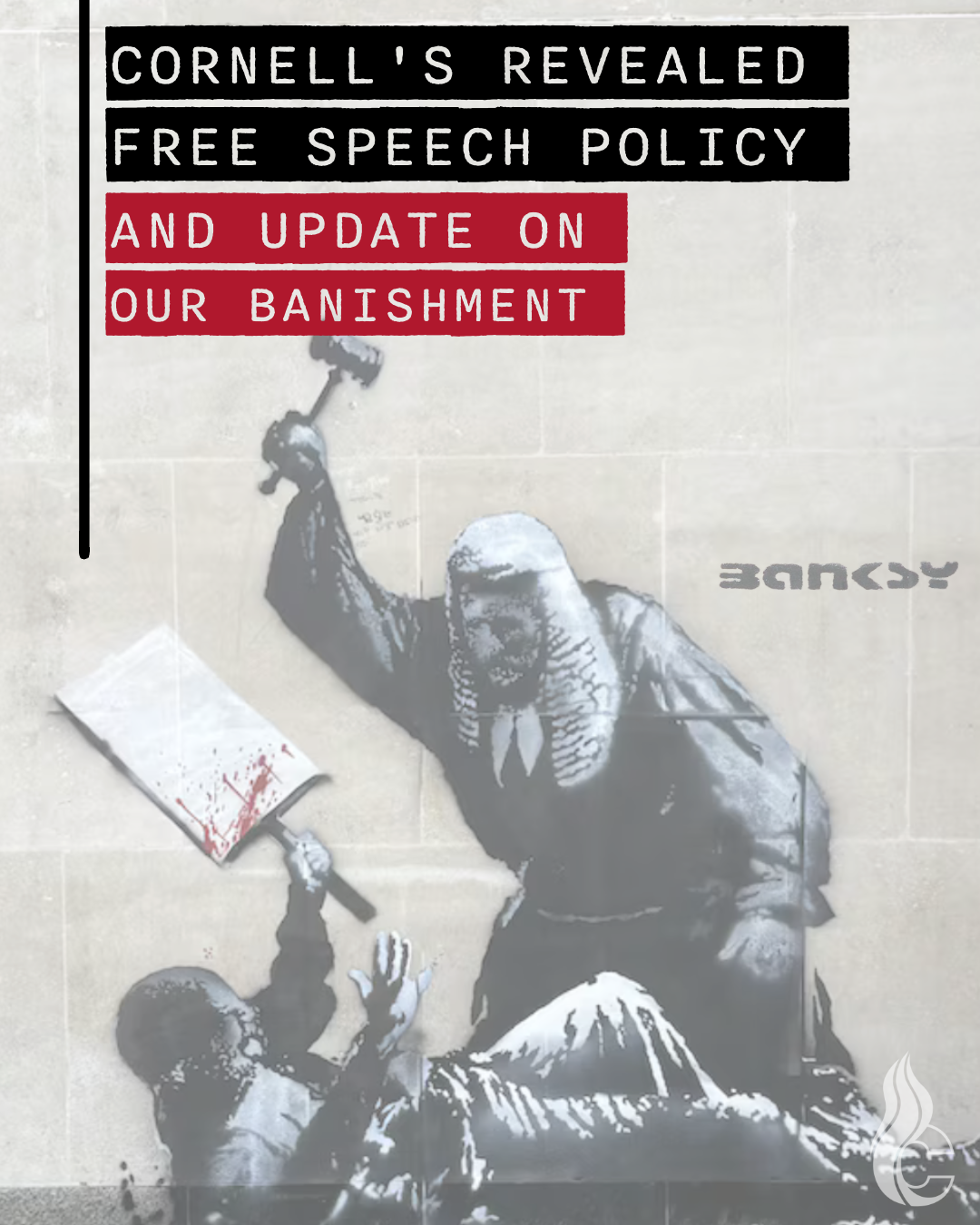
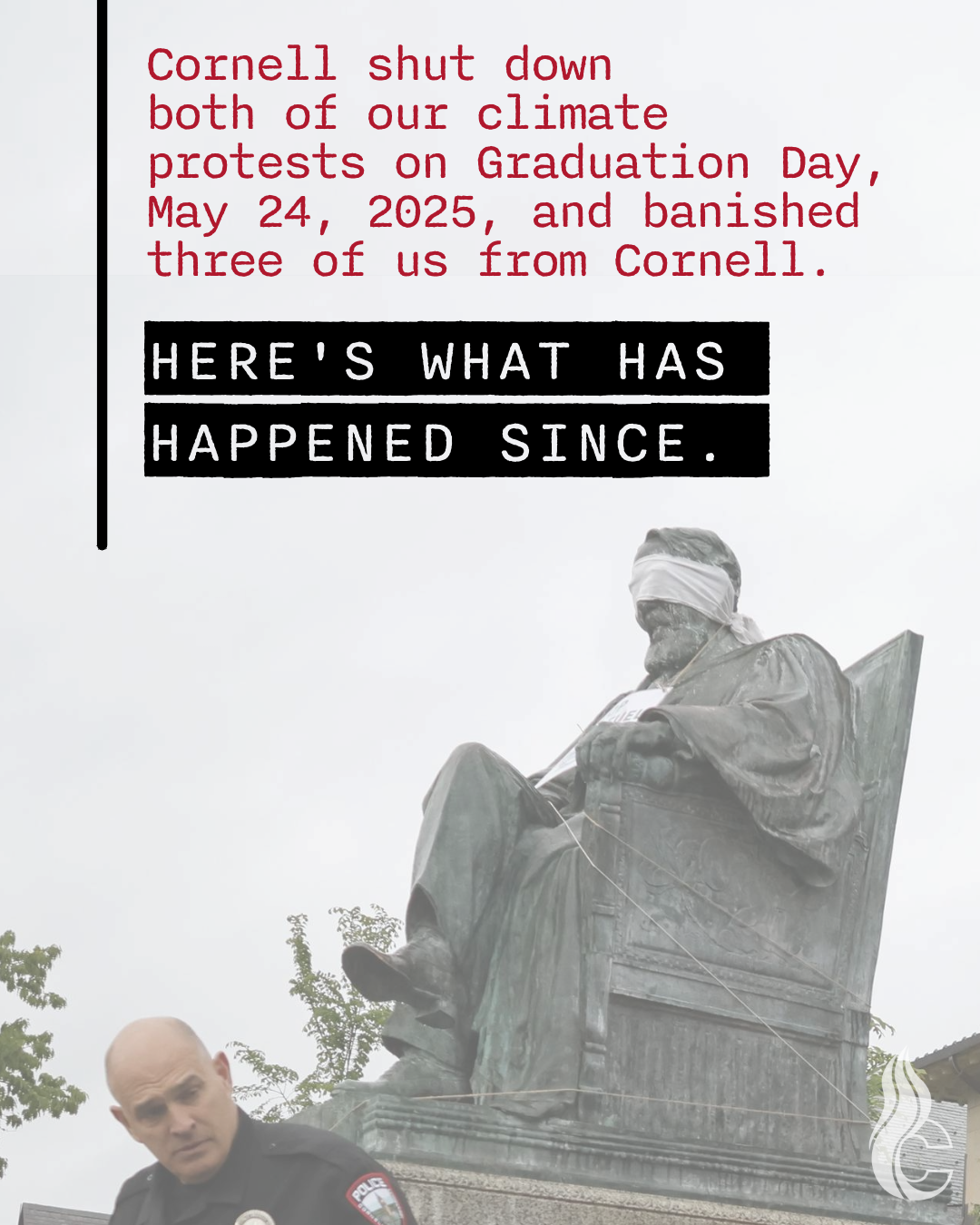
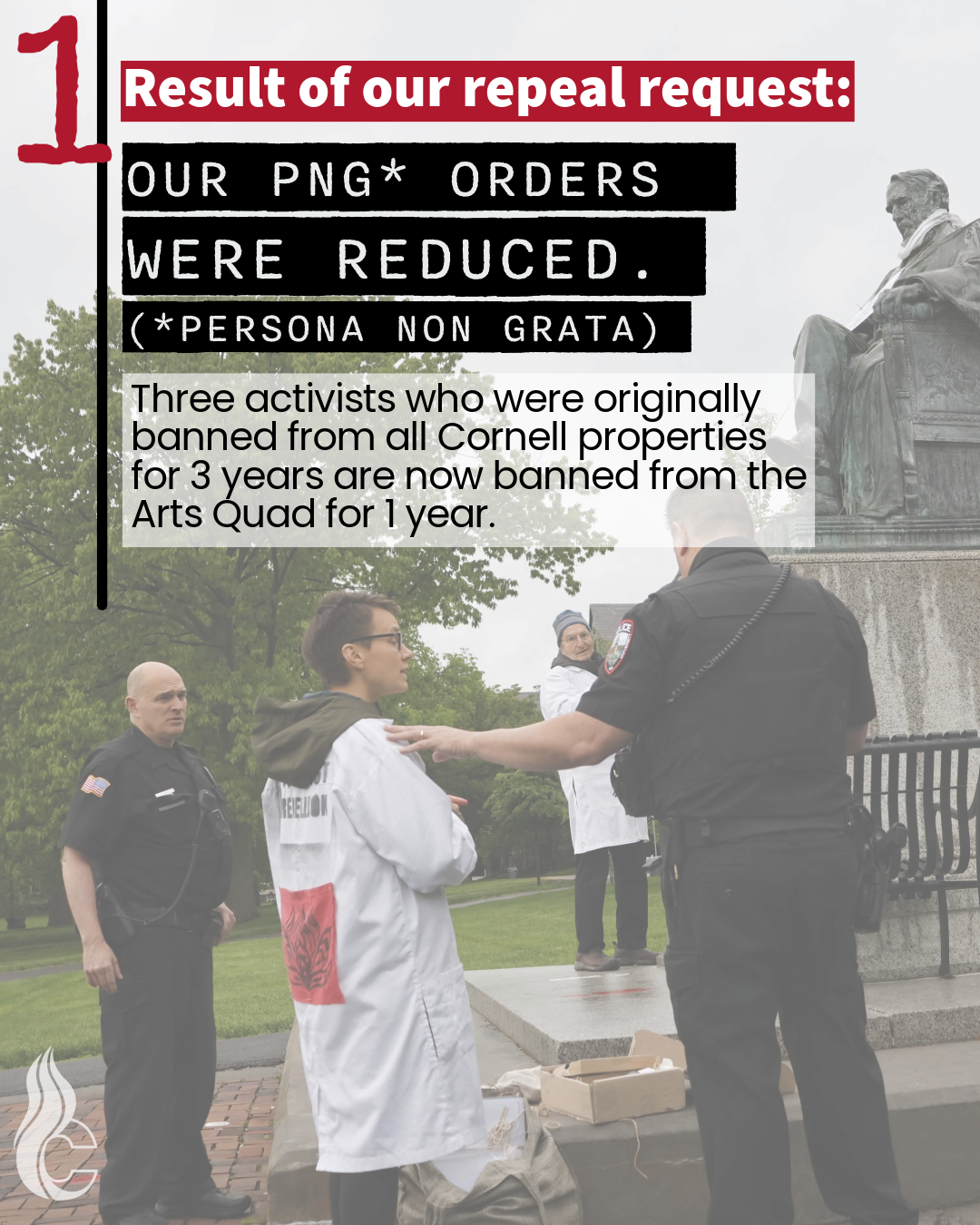
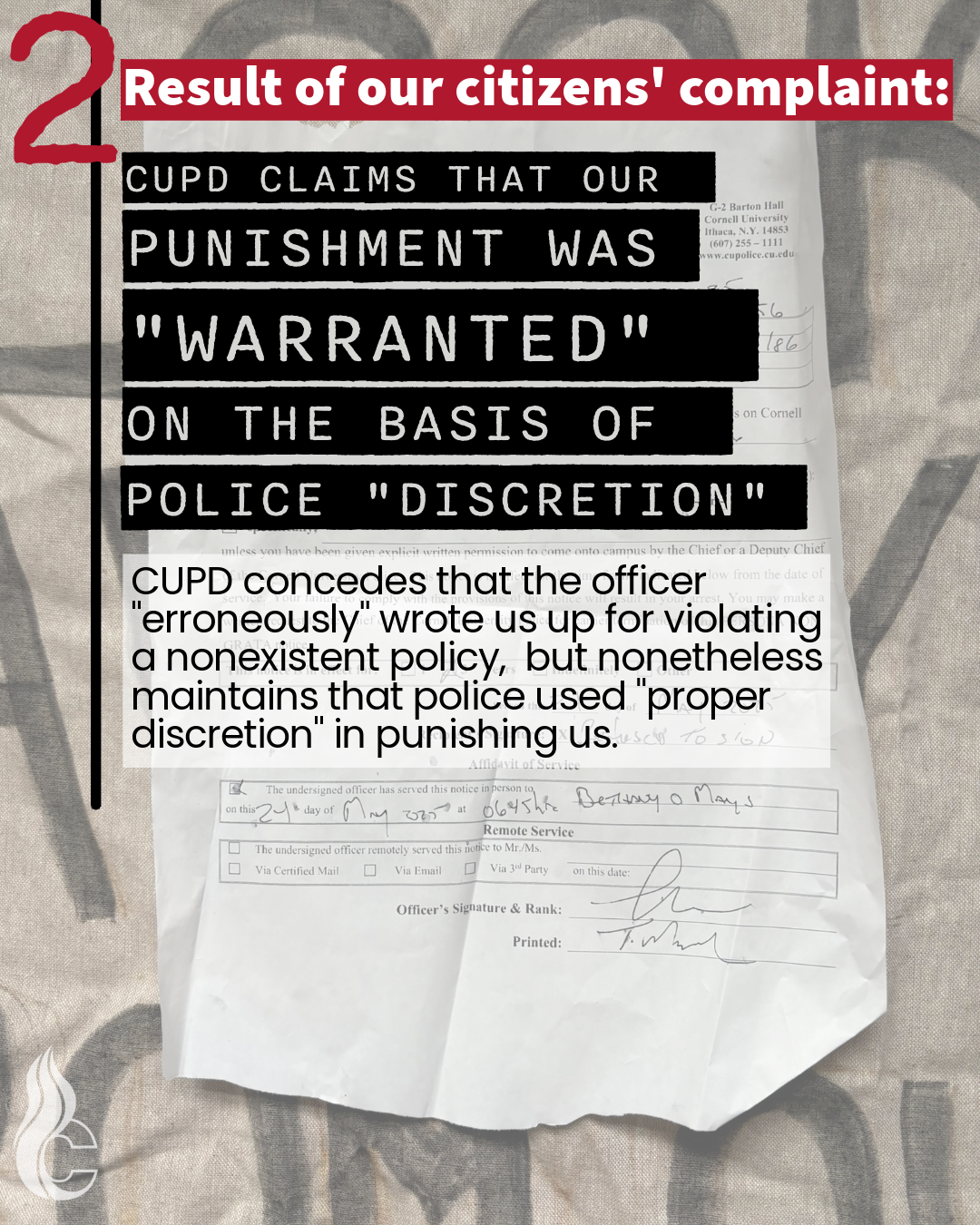
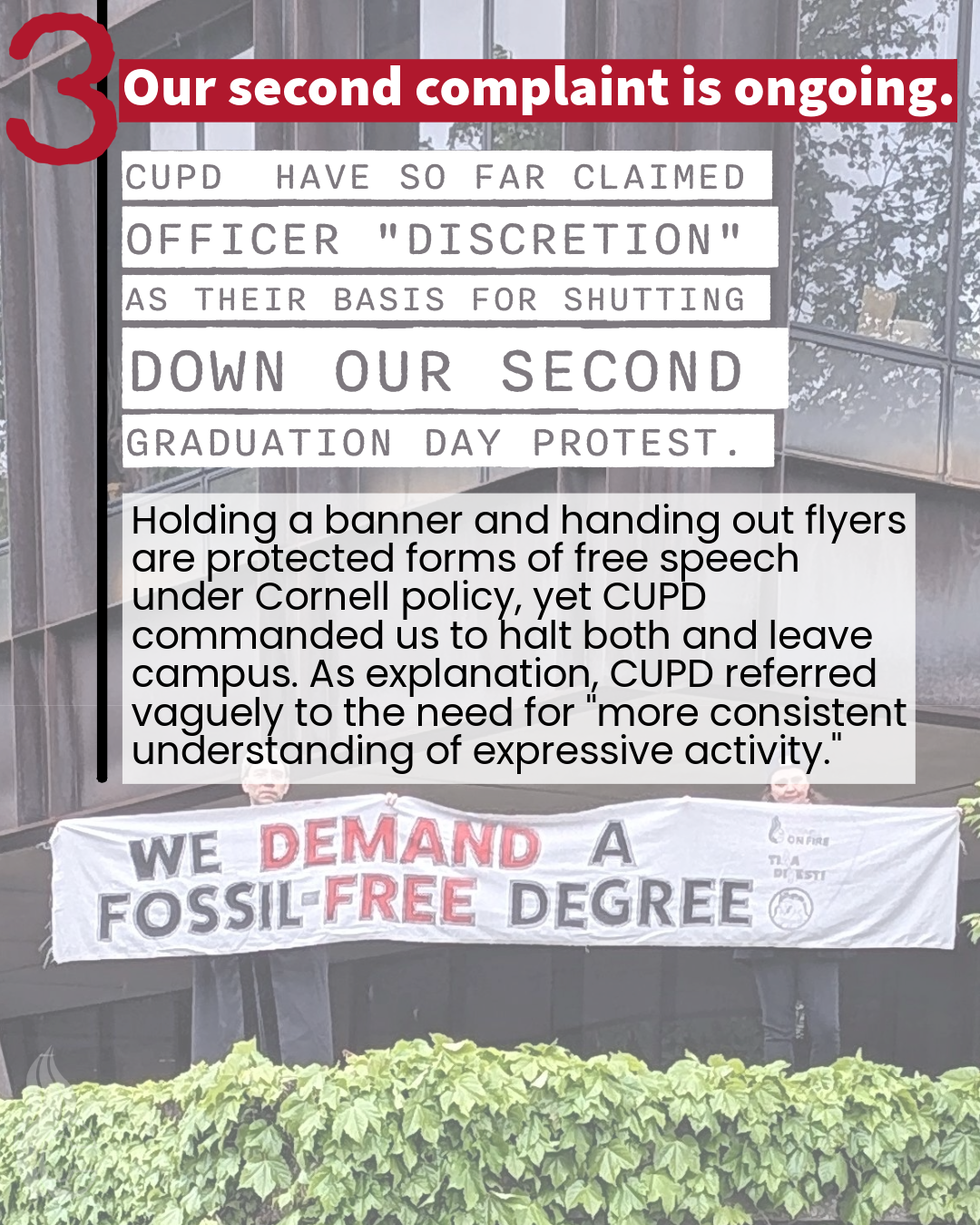
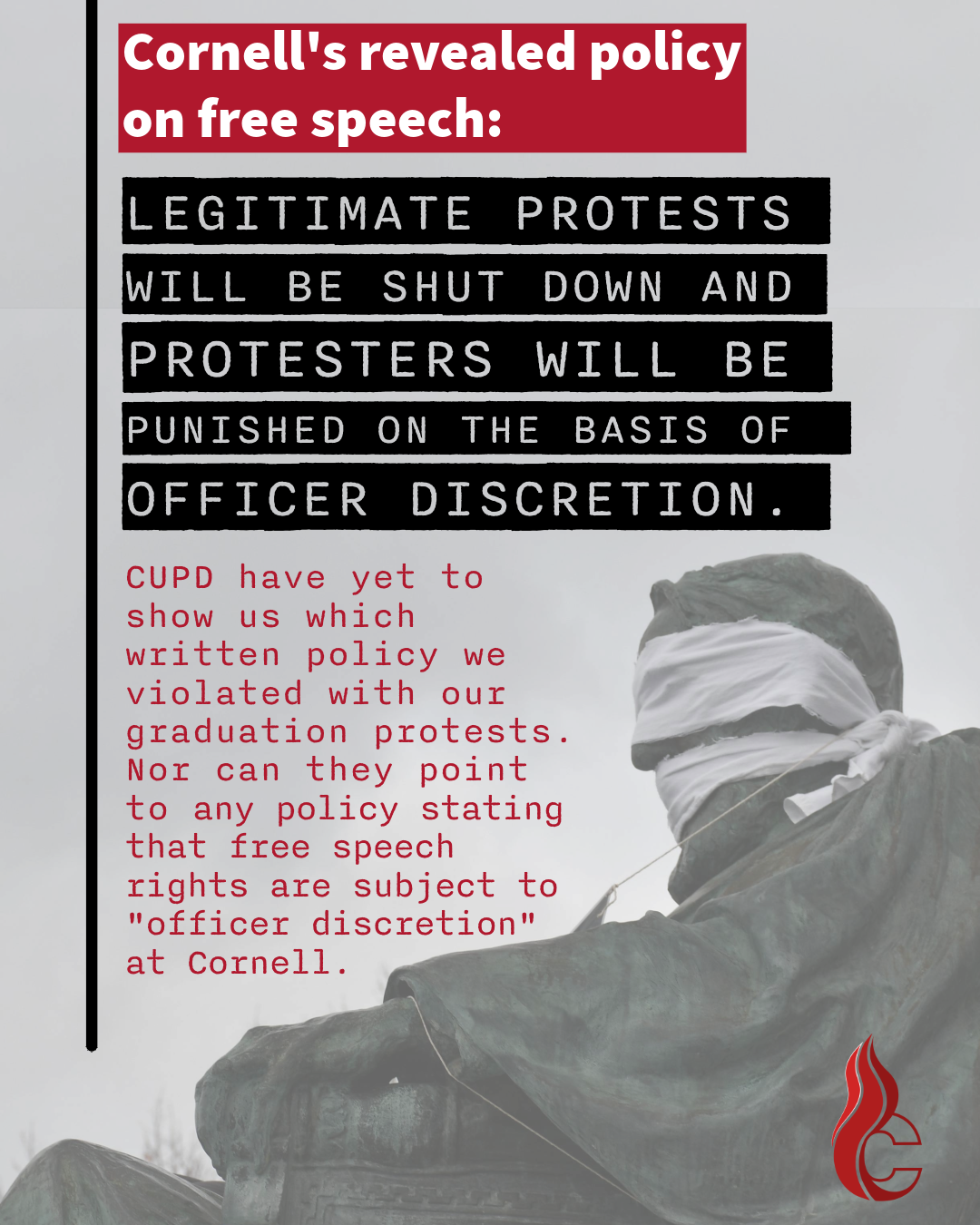
Dear Cornell on Fire,
The day after Banksy’s protest art was scrubbed from London’s Royal Courts of Justice, we received Cornell’s official answer as to why Cornell Police shut down our graduation protests on May 24: According to CUPD, punishments are issued at the “discretion” of police, unburdened by reference to policy and unconstrained by rights to free speech. (See all official correspondence here.)
In response to our appeals of the persona non grata orders that banned three of our activists from campus (pp. 2-12), CUPD decreed that, while we were mistakenly punished for violating a policy that does not exist, and while they could not point to any written policy that we did violate, nonetheless our PNG punishment was “warranted” on the basis of police “discretion.” Although the CUPD would not admit that the punishment issued was excessive, they did reduce the scope of our PNG orders.* We continued to pursue an explanation for our punishment through a citizens’ complaint (pp. 9-11), because contesting our arbitrary punishment may prevent future protesters from being so treated.
Our PNG orders state that we were punished for “UUP failure postering” (p. 1). The officer repeatedly demanded our “UUP permit” and punished us on grounds that we did not have one. Yet the policy requiring and producing such permits expired years ago (it has been partially replaced by the 25Live registration system, which is not required for protests). Nevertheless, CUPD confidently completed their official investigations with the following Kafkaesque declaration in an email to us (p. 12):
“Although the officer who erroneously misstated what a UUP was did not do so maliciously, we have had a conversation about that process and provided further training into what activities are allowed through Campus Code and the Expressive Activity Policy. He was unaware of some of the intricacies of policy however now is…I do believe they used proper discretion in not issuing any penal law or local ordinance violations to the group and that the issuance of the PNG’s were warranted.”
Meanwhile, we await the official conclusion of a separate complaint regarding the police shutdown of our second graduation protest (pp. 13-14). Why were members of the Cornell community denied their right to exercise free speech by holding a banner and handing out flyers? That ongoing complaint has so far yielded similar results: while CUPD can point to no policy that was violated, they have alluded to officer discretion as justification for shutting it down – with a vague written assertion (admission?) that “consistent understanding of the expressive activity policy at Cornell University is necessary” (p. 15).
The revealed presumption of CUPD is that “law enforcement” is vested with the authority to interpret people’s behavior at the time of an alleged violation, even if they cannot point to any policy that is being violated, and even if the protesters can point to policies that protect their free speech. This approach lacks the accountability and transparency guaranteed in any democratic system of law enforcement.* Lacking these guarantees, the system is autocratic.
We draw the following conclusions from our official correspondence with CUPD:
Free speech is not a right at Cornell University; it is subject to the discretion of CUPD and the whims of their administrative bosses.
CUPD are vested with sole authority to issue arbitrary and capricious punishments without reference to law or stated policy.
The Expressive Activity Policy that supposedly protects free speech on campus (even with its many pitfalls) is trumped by the “discretion” of CUPD. No form of speech is protected if an officer decides on the spur of the moment, based on his or her “discretion” or administrators’ “hopes,” that it should get shut down.*
This is not to say that you – or we – should stop protesting. Quite the opposite. Robin D. G. Kelley cogently argues that our responsibility “is to choose a side and fight…[we must] cast our lot with the insurgent class and enter the struggle.” And if we conceptualize our struggle in terms of “the attack on higher education,” then let’s join other commentators in thinking critically about a phrase that
"unhelpfully conjures an image of two distinct warring entities (the government, on the one hand, and colleges and universities, on the other). More and more, that image is inaccurate. The administrative strata of our colleges and universities are acting voluntarily to align their actions with the ideology of the government, becoming another arm of federal and state government."
As Ezra Klein reminds us, “power is a coordination problem.”* We, the actual Cornell community, can refuse to coordinate with the administration’s worst authoritarian impulses while coordinating our own pushback. That’s why over 80 individuals signed a letter to Cornell’s Chief of Police requesting a meeting to discuss his authorization of apparently unwarranted PNG orders (pp. 16-17)– a request that will not be ignored, at least by us.
We’re left with an open question: Over 50 statue-blindfolding actions identical to the one we carried out on May 24 took place across North America (including at Cornell) in the last year. Not a single one saw police sanctions in response. Why is Cornell now the outlier?
We want to hear your answers! Join our next working group meeting tomorrow (9/17, 1-2pm virtually), or attend tomorrow’s Fall Kickoff Dinner for students or our October 3rd art-ivism social for everyone!
Against discretionary abuse,
Cornell on Fire
*Asterisks indicate where supplemental notes can be found by scrolling below.
* * * * *
View the corresponding social media posts for this blog post on Instagram and Mastodon.
* * * * *
Plurivocality: CoF Posts are written by a revolving team of writers. Our movement is diverse, so are our thoughts, and so will be our posts. If you receive a CoF Post that you think is wrong headed, can we still walk together? (We, like you, sometimes write things we later laugh at!)
* * * * *
SUPPLEMENTAL NOTES
*Definition of the Cornell Community. As outlined in the Expressive Activity Policy (see “Scope”), current students, staff, faculty, and sponsored guests are members of the Cornell community whose right to free speech are protected. By extension, Cornell implies that no one else has protected rights to free speech on their properties. Reasonable observers could contest the notion that Cornell is in fact private property on several grounds: (1) Ithaca is a company town and Cornell owns over 60% of the property within the City; (2) Cornell’s private, armed police force essentially operates as a public entity; and (3) Cornell receives federal and state funding for its public colleges, and Cornell acquired much of their land holdings as part of the Land Grab (“Land Grant”) system.
*Cornell lacks the basic guarantees of democratic law enforcement as a claimed “private” entity. Because it claims to be “private” property, Cornell technically has the right to bar anyone from their property for no reason if they are not a member of the exclusively-defined “Cornell community.”* While this may be the unspoken pretext for the PNG orders issued to activists whose status in the “Cornell community” is gray, it certainly does not explain why CUPD shut down an allowable protest by full-fledged Cornell community members three hours later. More to the point: As an educational institution whose mission includes free and open inquiry and expression, Cornell should uphold Constitutional Rights to free speech for everyone.
*A fourth conclusion about Cornell’s revealed free speech policy: CUPD further informed us in their response to our citizens’ complaint about our PNG orders that: "Although your interaction did not go as you had hoped, we found that the officers were not in violation of any policy or procedure in their handling of the call. The officers may have been short in conversation and not explanatory enough however not in violation." We conclude that: (4) More generally, any “enforcement” action that’s not explicitly forbidden by law (which the officers may or may not be familiar with) or university regulations (ditto) is allowed. We leave it to you to imagine just how far the police high-handedness can be taken under this rule of engagement. We also wonder: Is police “discretion” code for following executive orders from autocratic university leadership who “hope” to see protesters punished?
*Reduction in scope of PNG orders to Cornell on Fire activists. In response to our initial repeal request, CUPD Chief Bellamy reduced the PNG orders issued to three of our activists: now they are only banned from the Arts Quad (instead of all Cornell owned, operated, or maintained properties) and they are banned for 1 (not 3) years. We reported this reduction of punishment in our June CoF Post.
*Power as a coordination problem. Cornell Administrators currently enjoy a monopoly on coordinating power. They can order their private police force to arrest protesters on flimsy (or no) pretext; they decide how to spend (or waste) university resources; they have the platform in a company town where many people (rightly) respect Cornell and (wrongly) assume that Cornell the Corporation acts in the best interests of Cornell the University (or the Ithaca community). But Ezra Klein points out that “everyone in society — every person, every institution — is a node of coordination.” People take their signals from one another – not just the Cornell administration – and we need to stop acting like this is normal.
